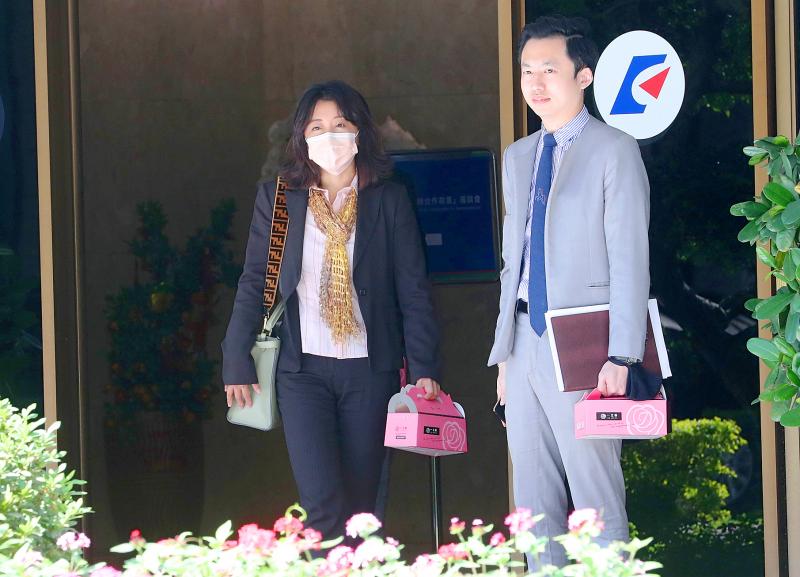US semiconductor industry leaders yesterday called for Taiwan and the US to sign a free-trade agreement and for Taiwan to enter the Comprehensive and Progressive Agreement for Trans-Pacific Partnership (CPTPP), the Ministry of Economic Affairs said.
More than 100 Taiwanese and US semiconductor industry leaders and government officials joined a virtual meeting, which included “prominent” officials from US President Joe Biden’s administration, the ministry said.
Minister of Economic Affairs Wang Mei-hua (王美花) told reporters in Taipei yesterday that she would not name the US officials out of a “longstanding mutual understanding.”

Photo: CNA
“Today’s meeting was mainly between industry leaders in the Taiwanese and US semiconductor supply chains,” Wang said.
On the US side, participants included Qualcomm, Corning, the Information Technology and Innovation Foundation, and the Semiconductor Industry Foundation.
Representatives from Taiwan Semiconductor Manufacturing Co (TSMC, 台積電) — the world’s biggest contract chipmaker — SEMI (a Taiwanese semiconductor industry association) and other companies and associations also participated.
TSMC general counsel Sylvia Fang (方淑華) and United Microelectronics (聯電) chief financial officer Liu Chi-tung (劉啟東) were among the participants.
The attendees pushed for closer cooperation between the two nations, Wang said.
“The word that came up over and over again is ‘interdependence,’” Wang said. “US and Taiwanese semiconductor supply chains rely on each other.”
“On the US side, it was suggested that Taiwan and the US should sign a free-trade agreement to deepen our cooperation,” Wang said.
“They would also like to see Taiwan and [South] Korea join the CPTPP, as well as the US,” she added.
She said that they want the US to push for an information-technology agreement within the WTO, which would “further reduce tariffs on semiconductors.”
TSMC also presented its plans to establish a manufacturing facility in Arizona, she said.
The meeting, which was conducted through videoconferencing, was the first supply chain cooperation meeting held by the Taipei Economic and Cultural Representative Office in the US and the American Institute in Taiwan, Wang said, adding that more would follow.
A shortage of chips used in auto production was not a main topic at the meeting, she said.
However, the US relayed its thanks to Taiwanese chipmakers for agreeing to give automotive chips priority to try to ease the shortage, she added.
“Industry leaders and government officials thanked Taiwan for our help with regard to auto chips,” Wang said.

A Ministry of Foreign Affairs official yesterday said that a delegation that visited China for an APEC meeting did not receive any kind of treatment that downgraded Taiwan’s sovereignty. Department of International Organizations Director-General Jonathan Sun (孫儉元) said that he and a group of ministry officials visited Shenzhen, China, to attend the APEC Informal Senior Officials’ Meeting last month. The trip went “smoothly and safely” for all Taiwanese delegates, as the Chinese side arranged the trip in accordance with long-standing practices, Sun said at the ministry’s weekly briefing. The Taiwanese group did not encounter any political suppression, he said. Sun made the remarks when

The Taiwanese passport ranked 33rd in a global listing of passports by convenience this month, rising three places from last month’s ranking, but matching its position in January last year. The Henley Passport Index, an international ranking of passports by the number of designations its holder can travel to without a visa, showed that the Taiwan passport enables holders to travel to 139 countries and territories without a visa. Singapore’s passport was ranked the most powerful with visa-free access to 192 destinations out of 227, according to the index published on Tuesday by UK-based migration investment consultancy firm Henley and Partners. Japan’s and

BROAD AGREEMENT: The two are nearing a trade deal to reduce Taiwan’s tariff to 15% and a commitment for TSMC to build five more fabs, a ‘New York Times’ report said Taiwan and the US have reached a broad consensus on a trade deal, the Executive Yuan’s Office of Trade Negotiations said yesterday, after a report said that Washington is set to reduce Taiwan’s tariff rate to 15 percent. The New York Times on Monday reported that the two nations are nearing a trade deal to reduce Taiwan’s tariff rate to 15 percent and commit Taiwan Semiconductor Manufacturing Co (TSMC, 台積電) to building at least five more facilities in the US. “The agreement, which has been under negotiation for months, is being legally scrubbed and could be announced this month,” the paper said,

MIXED SOURCING: While Taiwan is expanding domestic production, it also sources munitions overseas, as some, like M855 rounds, are cheaper than locally made ones Taiwan and the US plan to jointly produce 155mm artillery shells, as the munition is in high demand due to the Ukraine-Russia war and should be useful in Taiwan’s self-defense, Armaments Bureau Director-General Lieutenant General Lin Wen-hsiang (林文祥) told lawmakers in Taipei yesterday. Lin was responding to questions about Taiwan’s partnership with allies in producing munitions at a meeting of the legislature’s Foreign Affairs and National Defense Committee. Given the intense demand for 155mm artillery shells in Ukraine’s defense against the Russian invasion, and in light of Taiwan’s own defensive needs, Taipei and Washington plan to jointly produce 155mm shells, said Lin,